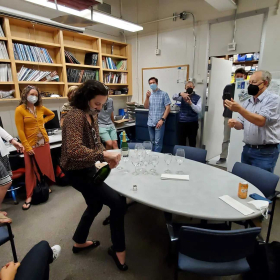Caroline Ackley defends her PhD thesis expertly managing the weight of the world!
 Title: Feeling the Weight of the World: Gravity sensation and sensory integration in C. elegans
Title: Feeling the Weight of the World: Gravity sensation and sensory integration in C. elegans
The ability to sense Earth’s gravitational pull is essential for orientation, navigation, and proprioception in most organisms. In my dissertation work, I found that C. elegans adults and dauer larvae exhibit pronounced negative gravitaxis and that this behavior is modulated by other environmental inputs, including light and electromagnetic fields. I also found that components of the DEG/ENaC pathway that are involved in gentle touch sensation – specifically the neuronally-enriched microtubule subunits MEC-7 and MEC-12, but not the related MEC-4 and MEC-10 mechanosensory subunits – are required for negative gravitaxis. In addition, TRPA-1, a receptor protein associated with cold and mechanosensation in both mammals and invertebrates, is critical for this behavior. Finally, I show that the PVD neurons, which use TRPA-1 to detect harsh cold, but not the touch receptor neurons (TRNs), are essential for negative gravitaxis. These findings implicate a complex, interconnected mechanism for gravity sensation involving an ion channel that is also present in the mammalian vestibular system, suggesting possible homology in gravity sensing across animal phylogeny.

